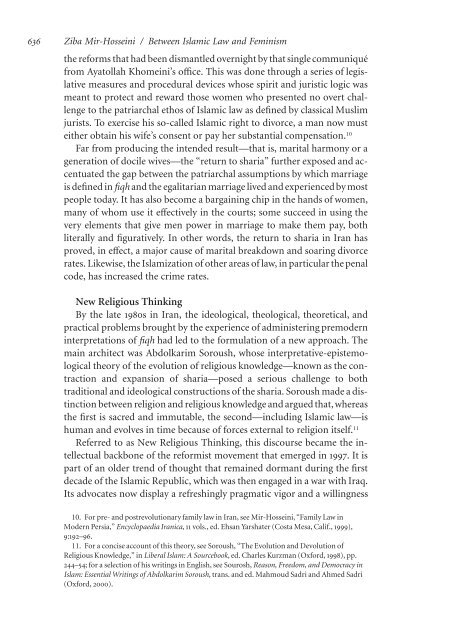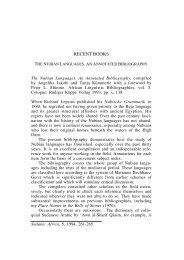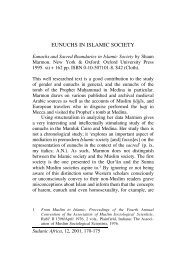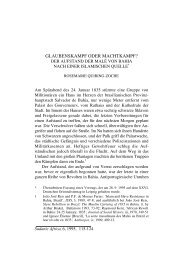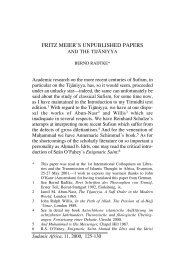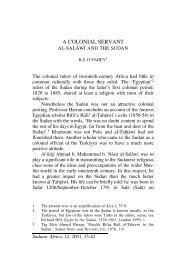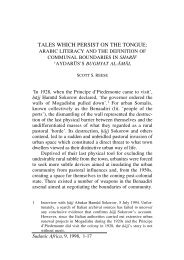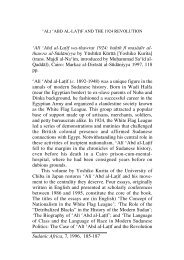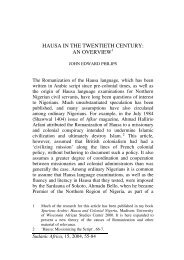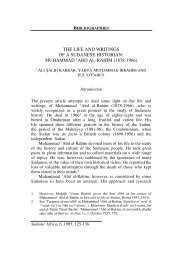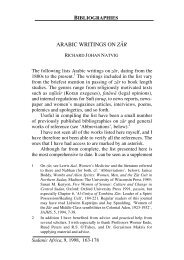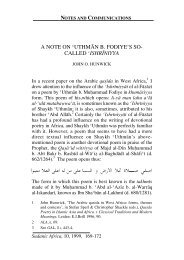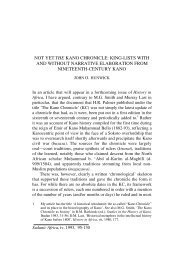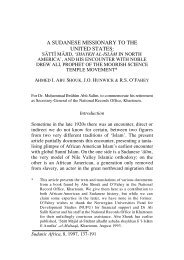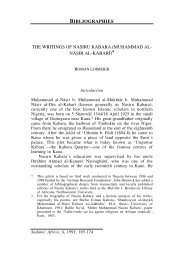Muslim Women's Quest for Equality: Between Islamic Law and ...
Muslim Women's Quest for Equality: Between Islamic Law and ...
Muslim Women's Quest for Equality: Between Islamic Law and ...
Create successful ePaper yourself
Turn your PDF publications into a flip-book with our unique Google optimized e-Paper software.
636 Ziba Mir-Hosseini / <strong>Between</strong> <strong>Islamic</strong> <strong>Law</strong> <strong>and</strong> Feminismthe re<strong>for</strong>ms that had been dismantled overnight by that singlecommuniquéfrom Ayatollah Khomeini’s office. This was done through a series of legislativemeasures <strong>and</strong> procedural devices whose spirit <strong>and</strong> juristic logic wasmeant to protect <strong>and</strong> reward those women who presented no overt challengeto the patriarchal ethos of <strong>Islamic</strong> law as defined by classical <strong>Muslim</strong>jurists. To exercise his so-called <strong>Islamic</strong> right to divorce, a man now musteither obtain his wife’s consent or pay her substantial compensation. 10Far from producing the intended result—that is, marital harmony or ageneration of docile wives—the “return to sharia” further exposed <strong>and</strong> accentuatedthe gap between the patriarchal assumptions by which marriageis defined in fiqh <strong>and</strong> the egalitarian marriage lived <strong>and</strong> experienced by mostpeople today. It has also become a bargaining chip in the h<strong>and</strong>s of women,many of whom use it effectively in the courts; some succeed in using thevery elements that give men power in marriage to make them pay, bothliterally <strong>and</strong> figuratively. In other words, the return to sharia in Iran hasproved, in effect, a major cause of marital breakdown <strong>and</strong> soaring divorcerates. Likewise, the Islamization of other areas of law, in particular the penalcode, has increased the crime rates.New Religious ThinkingBy the late 1980s in Iran, the ideological, theological, theoretical, <strong>and</strong>practical problems brought by the experience of administering premoderninterpretations of fiqh had led to the <strong>for</strong>mulation of a new approach. Themain architect was Abdolkarim Soroush, whose interpretative-epistemologicaltheory of the evolution of religious knowledge—known as the contraction<strong>and</strong> expansion of sharia—posed a serious challenge to bothtraditional <strong>and</strong> ideological constructions of the sharia. Soroush made a distinctionbetween religion <strong>and</strong> religious knowledge <strong>and</strong> argued that,whereasthe first is sacred <strong>and</strong> immutable, the second—including <strong>Islamic</strong> law—ishuman <strong>and</strong> evolves in time because of <strong>for</strong>ces external to religion itself. 11Referred to as New Religious Thinking, this discourse became the intellectualbackbone of the re<strong>for</strong>mist movement that emerged in 1997. It ispart of an older trend of thought that remained dormant during the firstdecade of the <strong>Islamic</strong> Republic, which was then engaged in a war with Iraq.Its advocates now display a refreshingly pragmatic vigor <strong>and</strong> a willingness10. For pre- <strong>and</strong> postrevolutionary family law in Iran, see Mir-Hosseini, “Family <strong>Law</strong> inModern Persia,” Encyclopaedia Iranica, 11 vols., ed. Ehsan Yarshater (Costa Mesa, Calif., 1999),9:192–96.11. For a concise account of this theory, see Soroush, “The Evolution <strong>and</strong> Devolution ofReligious Knowledge,” in Liberal Islam: A Sourcebook, ed. Charles Kurzman (Ox<strong>for</strong>d, 1998), pp.244–54; <strong>for</strong> a selection of his writings in English, see Sourosh, Reason, Freedom, <strong>and</strong> Democracy inIslam: Essential Writings of Abdolkarim Soroush, trans. <strong>and</strong> ed. Mahmoud Sadri <strong>and</strong> Ahmed Sadri(Ox<strong>for</strong>d, 2000).


